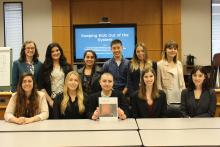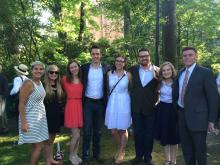LSJ students interested in graduating with Honors have three options:
1. Interdisciplinary Honors–Requires completion of the UW Honors core curriculum
2. Departmental Honors–Requires completion of LSJ Departmental Honors requirements
3. College Honors–Requires completion of UW Honors core curriculum and LSJ departmental honors requirements
If you are interested in graduating with Interdisciplinary Honors or College Honors, please refer to the UW Honors Program Website.
LSJ Honors
Overview
LSJ Honors offers LSJ majors the opportunity to explore a particular research question in significant depth with the assistance and guidance of a faculty mentor. This option is designed for students who are deeply interested in learning more about a particular topic, have a strong desire to conduct original, independent research, and are highly self-motivated. The most successful honors theses often build on prior research or coursework. In addition to conducting original research, students accepted to the Honors Program are required to take a third LSJ Department seminar (beyond the one already required for the major).
LSJ Honors is an especially good fit for students who believe they may wish to pursue an advanced degree in the social sciences. If you are seeking a "hands on experience" or wish to work closely with a particular faculty member, but are not especially interested in conducting original and independent research, please ask an advisor about other ways of obtaining the experiences you seek. (LSJ offers many other immersive and experiential learning opportunities, including study abroad experiences, mixed enrollment courses, Philanthropy Lab, reading groups held in Washington State prisons, and more.) If your goal is to generate an exemplary writing sample for an application to law or other professional school, we recommend working with a writing center to polish an essay or paper you have written for one of your classes; conducting original research through the LSJ Honors Program is not needed for this purpose.
The subsequent research and development of the thesis that occurs in the Fall and Winter quarters will be supervised by an LSJ faculty supervisor and a faculty reader. Honors theses are also read and evaluated by a second faculty reader. Any UW professor from any department or program may serve as a faculty reader. If you are accepted to the Honors Program, you and your faculty adviser will work together to identify to an appropriate reader. The reader must agree to serve in this capacity by the end of Fall quarter.
Eligibility Requirements
To be eligible for the LSJ Honors Program, students must have and maintain a minimum 3.75 cumulative grade point average in their LSJ courses and maintain at least a 3.5 overall GPA. Students who meet these criteria and have discussed the honors option with an advisor are welcome to apply to the Honors Program.
Application Process
Before applying to the honors program, you are strongly encouraged to attend the informational workshop offered toward the end of winter quarter. You are required to discuss your draft proposal with at least one faculty member whom you will list as a potential advisor at least a week BEFORE submitting your application. The purpose of this meeting is for you to ask for and receive feedback on your draft proposal. Be sure to send your proposal to the faculty member you would like to meet with in advance of that meeting so that they have time to read and respond to your proposal.
To be eligible to apply, you must attend the required informational workshop conducted by Kat Eli. Kat will host three workshops; you only need to attend one.
Tuesday, January 27th at 2:00pm PST | Zoom Meeting
Wednesday, February 11th at 11:00am PST | LSJ Conference Room Smith Hall M261
Monday, February 23rd at 3:00pm PST | Zoom Meeting
To apply to the LSJ Honors Program for 2026-2027, please submit the application online. The deadline for 2026-2027 is Wednesday, February 25th at 4:00pm.
You will be asked to upload the following documents:
- An unofficial transcript; and
- A 2-page (double-spaced) research proposal that includes your name, UW email address, and student ID number, and addresses the following topics:
- What is your research question, and why is it important? How does it relate to issues you have discussed in your LSJ coursework?
- How will you answer this research question? What data/evidence will you collect and/or analyze to answer this question, and how will you analyze these data?
- How does this research project build on work you have done in your other courses?
- Please identify at least two LSJ faculty who would be appropriate advisors for your project and explain how your proposed topic relates to their research interests.
- A writing sample from another course that best represents your writing, research and analytical skills.
Options for Honors Faculty Supervisor
On the application form, you are asked to identify two (2) faculty members who, based on their areas of expertise, would be an appropriate thesis adviser. Be sure to familiarize yourself with all of the LSJ faculty’s research areas so that you are in a position to identify these possible advisers. The following LSJ faculty members are eligible to serve in this capacity:
- Katherine Beckett
- Rachel Cichowski
- Ann Frost
- Jamie Mayerfeld
- Stephen Meyers
- Megan Ming Francis
- Morgan Vickers
- Sebastián Rubiano-Galvis
Application Considerations and Guidelines
In your application, be sure to explain why you want to conduct original research. Your thesis proposal should also clearly identify the research question you wish to explore, and explain how you (tentatively) plan to answer that question. (A research question not only addresses an issue or topic you would like to learn more about, and should be one that you can use data/evidence to answer over the course of two quarters). It should also explain how you became interested in this topic and why it is important for scholars interested in law, rights, and justice.
In deciding whether to supervise your honors thesis, the committee will consider whether you have taken classes that support your research. The committee will also consider the following:
- Has the applicant identified an appropriate research question?
- Does the applicant have a strong enough grasp of the material to take this project to fruition?
- Does the topic relate to LSJ as a whole and to the courses the student has taken?
- Is the research plan feasible and doable in two quarters?
- Is a faculty member with the relevant expertise available to serve as the thesis adviser?
Enrollment
If a student is accepted into the Honors Program, they will be notified by the middle of Spring Quarter and be enrolled in LSJ 488 for the following fall quarter. Admitted students are required to attend the Undergraduate Research Symposium in the Spring and complete a questionnaire that will be distributed upon acceptance to the program.
Grading and Expectations
Honors theses vary in length, but are most typically 30-50 pages long. Theses should identify and seek to answer a clear research question that is relevant to socio-legal studies and/or questions related to the study of justice and rights. All theses should clearly explain why the question they investigate matters, and how the analysis contributes to our understanding of the topic explored. The thesis should be clearly argued and well-organized, and the argument presented should be supported with data and other kinds of evidence. (Data include the evidence that a scholar uses to justify their claim. It can take many forms. Some scholars conduct interviews, focus groups, case studies, or ethnographic observations. Other scholars administer surveys or work with existing datasets. Still others may look to the existing literature to construct an argument and build on what we already know).
The thesis should also draw on, and contribute to, a relevant body of literature. (Literature refers to analyses published by other researchers. The UW library offers a list of research guides that can help you identify relevant academic literature. You may also consider using texts that yo have read in your classes or conducting a Google Scholar search.)
LSJ 488 and 489 are graded with decimal grades (not CR/NC). The grade for both quarters is only assigned after completion of the second quarter, at which time the student receives the same grade for both quarters. If a student completes LSJ 488 but not LSJ 489, the X received for LSJ 488 will remain an X.
Timeline
| Winter/Spring Quarter | Autumn Quarter | Winter Quarter | Spring Quarter |
| Attend info session in Winter quarter | Participate in LSJ Honors preparatory workshop LSJ 488 | Complete data analysis and draft thesis | Option to present at the Undergraduate Research Symposium |
| Consult with Undergraduate Research Program Office advising and LSJ advisors | Refine research goals and plan | Complete bibliography | |
| Conduct preliminary research and draft proposal | Meet with faculty mentor | Submit draft to mentor by 7th week | |
| Meet with potential faculty adviser about research proposal | Identify second reader | Submit revised thesis to mentor and reader by 9th week | |
| Submit application if appropriate | Commence literature review and data collection | Defend thesis by finals week | |
If accepted, attend Undergraduate Research Symposium and complete questionnaire |
Identifying a Research Question: Resources for Students
- “Developing a Research Question” on YouTube: https://www.youtube.com/watch?v=QauomrFcrXk
- What does a good research question look like? https://www.scribbr.com/research-process/research-question-examples/

